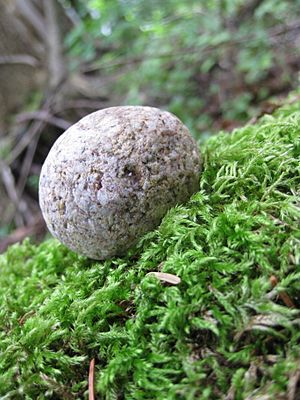A rolling stone gathers no moss facts for kids
The saying "A rolling stone gathers no moss" is a well-known proverb. It means that someone who is always moving from place to place, or changing jobs often, might not gather things like wealth, friends, or responsibilities. Think of a stone rolling down a hill; it doesn't stay still long enough for moss to grow on it.
This proverb can have different meanings today. Sometimes, it suggests that someone who moves around a lot avoids responsibilities or doesn't settle down. Other times, it can mean that someone who keeps moving stays fresh, active, and avoids becoming dull or old-fashioned. For example, the famous band The Rolling Stones chose their name to show this idea of constant movement and staying fresh.
Contents
What Does "A Rolling Stone" Mean?
The proverb "A rolling stone gathers no moss" talks about how people live their lives. It compares a person to a stone. If a stone keeps rolling, it won't get covered in moss. Moss grows on things that stay still for a long time.
The Two Sides of the Proverb
This saying has two main ways of being understood:
- Negative view: If you never settle down, you might miss out on important things. You might not build strong friendships, save money, or have a stable home. You could avoid duties and responsibilities.
- Positive view: Moving around can keep you active and fresh. It means you don't get stuck in old ways. You might gain new experiences and avoid becoming boring or lazy.
Where Did the Proverb Come From?
The idea behind "A rolling stone gathers no moss" is very old. It was first written down by a Roman writer named Publilius Syrus. He lived a long time ago, around 100 BC. In his writings, he said that people who are always moving and don't have roots in one place avoid duties and worries.
Early English Use
The exact English words "A rolling stone gathers no moss" first appeared in a book of proverbs in 1546. This book was written by John Heywood. He gave credit to a famous scholar named Erasmus.
Like a Plant That Moves
Erasmus also linked this proverb to other old sayings. One Latin proverb said, "A plant that is moved too often does not grow well." Another said, "A tree planted too often produces little fruit." These old sayings mean that if you keep moving a plant or tree, it won't grow as strong or produce as much as one that stays in one place for many years.
How the Meaning Changed
For a long time, the proverb mostly had a negative meaning. It suggested that moving around too much was not good. People thought it meant you wouldn't achieve much or build a stable life.
"A Day in the Moss"
In the 1800s, especially in Scotland, people used to cut peat in bogs. Peat is like soil made from old moss. Cutting peat was hard work done to prepare for winter. People called this "a day in the moss." An "itinerant" person (someone who travels a lot) or a "rolling stone" would likely not feel the need to do this hard work. They wouldn't settle down long enough to be part of a community that needed to prepare for winter. This showed how a "rolling stone" might avoid hard work or settling down.
Modern Interpretations
Today, the meaning is more flexible. While some still see it as a warning against being unsettled, others see it as a positive idea. The band The Rolling Stones used the name to show they were always moving forward and staying current. The song "Papa Was a Rollin' Stone" also uses the idea of someone who doesn't stay in one place.
See Also
 | Emma Amos |
 | Edward Mitchell Bannister |
 | Larry D. Alexander |
 | Ernie Barnes |


